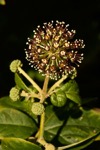| Scientific: | Eleutherococcus senticosus |
|---|---|
| Other: | Siberian Ginseng |
| Family: | Araliaceae |
| Synonym: | Acanthopanax senticosus |
Siberian ginseng, also called Eleuthero, is a classic adaptogen used to help the body cope with stress, boost immune function and improve both physical and mental performance. Historically it was used in Russia and Asia but its use has now been assimilated into western herbalism.
Research studies conducted on athletes and people subjected to various environmental stressors suggest that although eleuthero does not posses significant anabolic effects, it may increase the body's maximum work capacity and help with mental focus and memory. It also helps decrease fatigue, prevent exhaustion and improve quality of life in the elderly. It posses hepatoprotective properties that protect the body against chemical stressors, and recent clinical trials show it may reduce alcohol hangovers.
The active ingredients are broadly classified as " Eleuthrosides " : Eleutheroside A is a steroidal saponin that likely modulates stress hormones, and Eleuthrosides B & D are glycosides of lignans and phenylpropenes that potentially affect neurotransmitters.
Eleuthero has been shown to possess some immunomodulating effects. Research shows it has antiviral activity against some RNA viruses, like those responsible for colds and flus, but has no activity against DNA viruses like those that cause cold sores (e.g. herpes simplex virus). In cancer treatment, it mitigates some of the side-effects of radiation and chemotherapy (e.g. immunosuppression, fatigue). It may also have some direct anticancer and antimetastatic effects, but clinical trials are limited and efficacy has not been established.
Used similarly to Panax ginseng but is less stimulating and thus can be used long-term in young and elderly patients.
Endocrine
• stress
• adrenal fatigue
• chronic fatigue syndrome (CFS)
Immune
• colds
• influenza
• viral infection (RNA viruses)
- human rhinovirus (HRV)
- respiratory synctial virus (RSV)
- influenza A
Note: not effective against DNA viruses (adeno or herpes simplex virus).
Cancer
• chemotherapy and radiation side effects
• fatigue
• leukopenia
• neutropenia
• immunosuppresion
Cardiovascular
• poor heart function
• congestive heart failure (CHF)
• arrhythmia
Exercise
• suboptimal exercise performance (athletic use)
- reduced endurance
- prolonged recovery time
- suppressed immune system
CNS
• poor cognitive function
• attention deficit hyperactivity disorder (ADHD, ADD)
• sleep deprivation
• Adaptogen
• Tonic
• Stimulant
• Sedative
• Nootropic
• Cardiotonic
• Cardioprotective
• Antiarrhythmic
• Antihypertensive
• Anticancer
• Antiinflammatory
• Antioxidant
• Male Tonic
• Antiaging
• Triterpenes (Eleutheroside A)
• Phenylpropanoids (Eleutheroside B)
• Lignans (Eleutheroside C, D, E)
• Glycans (Eleutherans )
• Tincture (1:5) 2-5 ml tid
• Decoction (dried herb): 1-4g qd
Caution: Use with hypertensive patients; not clear if blood pressure is affected. Monitor BP.
Barnes J, Anderson LA, Phillipson JD. Herbal Medicines, 3rd ed. London: Pharmaceutical Press, 2007.
Bone K. Principles and Practice of Phytotherapy. Edinburgh: Churchill Livingstone, 2000.
Bone K. A Clinical Guide to Blending Liquid Herbs: Herbal Formulations for the Individual Patient. St Louis, MO: Churchill Livingstone, 2003.
Brinker F. The Toxicology of Botanical Medicines, 3rd ed. Sandy, Oregon: Eclectic Medical Publications, 2000.
Felter HW, Lloyd JU. King's American Dispensatory. 1898. http://www.ibiblio.org/herbmed/eclectic/kings/main.html. Accessed: August 19, 2006.
Hoffman D. Medical Herbalism. Rochester, Vermont: Healing Arts Press, 2003.
Weiss RF. Herbal Medicine. Beaconsfield, England: Beaconsfield Publishers Ltd, 1988.
Williamson EM, ed. Major Herbs of Ayurveda. Edinburgh: Churchill Livingstone, 2002
Disclaimer: This content is subject to change. The information is intended to inform and educate; it does not replace the medical evaluation, advice, diagnosis or treatment by a healthcare professional. www.nhpassist.com © 2014 NDAssist Inc. and/or its affiliates. All rights reserved.

|
Siberian Ginseng
SummarySiberian ginseng, also called Eleuthero, is a classic adaptogen used to help the body cope with stress, boost immune function and improve both physical and mental performance. Historically it was used in Russia and Asia but its use has now been assimilated into western herbalism. IndicationsSign in requiredActionsSign in requiredConstituentsSign in requiredPosologySign in requiredSafetySign in requiredReferencesSign in required |
|---|